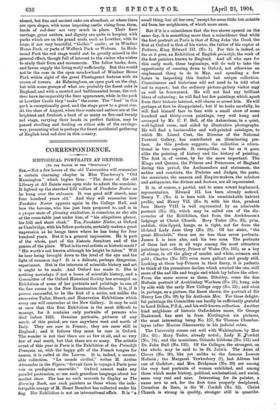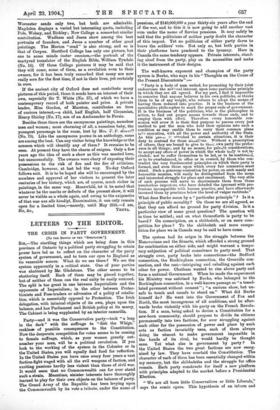SIE,—Not a few lovers of the old Universities will remember
a certain charming chapter in Miss Thackeray's " Old Kensington" which begins thus " The doors of the old Library at All Saints were open wide to admit the sunshine. It lighted up the starched frill collars of Fundator Nosier as he hung over the entrance. It was good stiff starch, near four hundred years old." And they will remember how Pundater Nosier appears again in the College Hall, and how the heroine, who has just been proposed to, and is in a Inver state of pleasing exaltation, is conscious, as she sits at the cross-table just nnder him, of " his ubiquitous glance, his frill and short cloak." Yes, Fundator Nosier, at Oxford or Cambridge, with his fellow-portraits, certainly makes a great impression as he hangs there where he has hung for four hundred years. But it is a general impression. He is part of the whole, part of the historic furniture and of the genius of the place. What is his real artistic or historic merit ? "His worth's not known although his height be taken." Will he bear being brought down to the level of the eye and the light of common day P It is a delicate, perhaps dangerous, experiment. But in the interests of scientific history and art it ought to be made. And Oxford has made it. She is nothing nowadays if not a home of scientific history, and a Committee of the Oxford Historical Society has arranged an Exhibition of some of her portraits and paintings in one of the fine rooms, in the New Examination Schools. It is, if it proves successful, to be the first of a series, not unlike the successive Tudor, Stuart, and Hanoverian Exhibitions which every one will remember at the New Gallery. It may be said at once that this first Exhibition is the most difficult to manage, for it contains only portraits of persons who died before 1625. Genuine portraits, pictures of any merit, of this period, are rare anywhere west and north of Italy. They are rare in France ; they are rarer still in England ; and it follows they must be rare in Oxford. The wonder is not that there are so few at all, and so very few of real merit, but that there are so many. The artistic event of this year in Paris is the Exhibition of the Primitifs Francais, as, with the happy gift of the French tongue for names, it is called at the Louvre. It is, indeed, a memor- able collection. "Le monde civilise," writes M. Arsine Alexandre in the Figaro,"devrait faire le voyage il Paris pour voir ce, prodigienx ensemble." Oxford cannot make any parallel pretension, or use such grandiose language about her modest show. She has no such marvels to display as The Burning Bush, nor such painters as those whom the inde- fatigable energy of IL Henri Bouchot has collected under his fag. Her Exhibition is not an international affair. It is "a
The University comes out well with WaLsingliam, by Mor (No. 61) ; Mary Tudor, already noted ; Lady E. Xowlett (No. 74); and the musicians, Orlando Gibbons (No. 131) and Dr. John Bull (No, 135). Of the Colleges, the strongest, on the whole, may be said to be St. John's. The Anne of Cleves (No. 30), like yet unlike to the famous Louvre Holbein • the Margaret Tewkesbury (?), last Abbess but one of odstow ; and Mrs. Bridgman (No. 39) are among the very best portraits of women exhibited, and among those which make history, political, ecclesiastical, and social, seem very real and near. Interesting for its painter, a name new to art, for the first time properly deciphered, Cornelius de Zeeu, is Sir W. Cordell (No. 52). Christ Church is strong in quality, stronger still in quantity. Worcester Benda only two, but both are admirable. Magdalen displays a varied but interesting quota, including Pole, Wolsey, and Hickley ; New College a somewhat similar contribution. Wadbam and Jesus show among the best portraits of founders, and Jesus a number of other good paintings. The Merton "send" is also strong, and so is that of Corpus. Hertford College has only one picture, but one to some minds inane omnium,—the portrait of the martyred translator of the English Bible, William Tyndale (No. 16). Of these College pictures it may be said that they will come, some of them, as a revelation even to their owners, for it has been truly remarked that many are now really seen for the first time, if not in their lives, yet certainly in ours.
If the ancient city of Oxford does not contribute many pictures of this period, these it sends have an interest of their own, especially Sir T. White (No. 37), of which we have a contemporary record of both painter and price. A private lender, Miss Gordon, of Marston, contributes an item of curious interest,—a child, half English, half Circassian, Henry Shirley (No. 17), son of an Ambassador to Persia.
Besides these there are the anonymous paintings, nameless men and women ; most charming of all, a nameless baby, the youngest personage in the room, lent by Mrs. F.
(No. 79). Like the anonymous poems in an anthology, some are among the best. Can any visitor bring the knowledge or the acumen which will identify any of them? It remains to be seen. At present they have the charm of enigma. Only a few years ago the idea of such a show as this was mooted here, but unsuccessfully. The owners were chary of exposing their possessions to the risk of fire and the fire of criticism. Cambridge, however, at last led the way. To-day Oxford follows suit. It is to be hoped she will be encouraged by the numbers and approval of her visitors to present the later centuries of her history, which are, of course, much richer in paintings, in the same way. Meanwhile, let it be noted that whatever be the merits or defects of the present show, it will never be visible as a whole again, and owing to the exigencies of that was ens atle bandigt, Examination, it can only remain open for a limited time,—namely, until May 26th.—I am,
Sir, Sm., THETA.
LETTERS TO THE EDITOR.
THE CRISIS IN PARTY GOVERNMENT.
[To ass MOTOR OP TUE "SPECTATOR."] Sin,—The startling things which are being done in this province of Ontario by a political party struggling to retain power have led us to reflect on the character of the party system of government, and to turn our eyes to England as its venerable source. What do we see there ? We see the system apparently in a critical state. One of your parties was shattered by Mr. Gladstone. The other seems to be shattering itself. Each of them may be pieced together, but of neither of them can the real unity be easily restored. The split is too great in one between Imperialists and the opponents of Imperialism; in the other between Protec- tionists and Free-traders or advocates of a policy of retalia- tion, which is essentially opposed to Protection. The Irish delegation, with inimical objects of its own, plays upon the balance, and has Parliament and British policy at its mercy. The Cabinet is being supplanted by an interior camarills.
The well-known exponent and champion of the party system is Burke, who says in his " Thoughts on the Cause of the Present Discontents"
"Party is a body of men united, for promoting by their joint endeavours the nat4,nal interest, upon some particular principle in which they are all agreed. For my part, I find it impossible to conceive that anyone believes in his own politicks, or thinks them to be of any weight, who refuses to adopt the means of having them reduced into practice. It is the business of the speculative philosopher to mark the proper ends of government. It is the business of the politician, who is the philosopher in action, to find out proper means towards those ends, and to employ them with effect. Therefore every honorable con- nexion will avow it is their first purpose to pursue every just method to put the men who hold their opinions into such a condition as may enable them to carry their common plans zee execution, with all the power and authority of the State. As this- 'vows: !...^ vet shed to certain situations, it is their duty to contend for those siuoist.t9ns. Without a proscription of others, they are bound to give to tholz.own party the prefer- ence in all things; and by no means, for private considerations, to accept any offers of power in which the whole 'body ia not in- cluded; not to suffer themselves to be led, or to be controuwd, or to be overbalanced, in office or in council, by those who con- tradict the very fundamental principles on which their party is formed, and even those upon which every fair connexion must stand. Such a generous contention for power, on such manly and honorable maxims, will easily be distinguished from the mean and interested struggle for place and emolument. The very stile of such persons will serve to discriminate them from those numberless impostors, who have deluded the ignorant with pro- fessions incompatible with human practice, and have afterwards incensed. them by practices below the level of vulgar rectitude." What does Burke mean by a " particular principle"? Is it a principle of 'public morality? On these we are all agreed, so that they can afford no ground for party division. Is it a particular view of some great question P The question will in time be settled ; and on what thenceforth is party to be based? On conscription, on a shibboleth, or on mere com- petition for place ? To the shibboleth and mere compe- tition for place we in Canada may be said to have come.











































 Previous page
Previous page